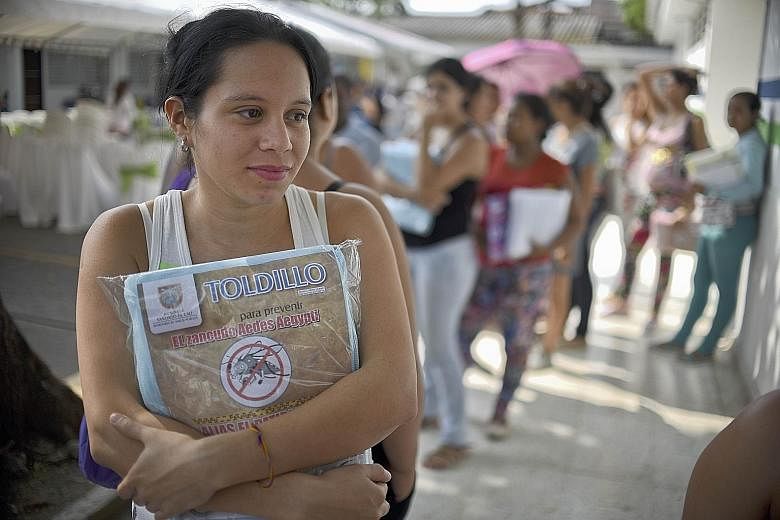CHICAGO • Researchers have reported new evidence strengthening the association between the Zika virus and a spike in birth defects, citing the presence of the virus in the brain of an aborted foetus of a European woman who became pregnant while living in Brazil.
An autopsy of the foetus showed microcephaly, or small head size, as well as severe brain injury and high levels of the Zika virus in foetal brain tissues, exceeding levels of the virus typically found in blood samples, researchers in Slovenia from the University Medical Centre in Ljubljana reported in the New England Journal of Medicine.
The findings came as the World Health Organisation (WHO) advised women on how to protect themselves from Zika, particularly if pregnant, but also reassured them that most women in areas affected by the mosquito-borne virus will give birth to "normal infants".
In its advice on Wednesday, the WHO said women in areas with the virus should protect themselves, especially during pregnancy, by covering up against mosquitoes and practising safe sex through the use of condoms. It said more evidence was needed to confirm whether sex commonly transmits the virus.
The findings reported on Wednesday help "strengthen the biologic association" between Zika virus infection and microcephaly, researchers from the Harvard School of Public Health and Massachusetts General Hospital in Boston wrote in an editorial that accompanied the paper.
Brazil, the worst-hit country in an outbreak sweeping the Americas and now present in more than 30 countries, is investigating a potential link between Zika infections and more than 4,000 suspected cases of microcephaly. Researchers have identified evidence of Zika infection in 17 of these cases, either in the baby or the mother, but have not confirmed the virus can cause microcephaly. There is no treatment or vaccine for the Zika virus.
Professor Tatjana Avi-upanc, who led the researchers in Slovenia, said in an e-mail her team's findings "may present the most compelling evidence to date" that birth defects associated with Zika infection in pregnancy may be caused by replication of the virus in the brain.
As scientists race to find out more about the virus, 30 of the world's leading scientific research institutions, journals and funders pledged to share for free all data and expertise on the virus as soon as they have it.
"The arguments for sharing data and the consequences of not doing so (have been)... thrown into stark relief by the Ebola and Zika outbreaks," said the agreement by an unprecedented number of signatories in the Americas, Japan, Europe and elsewhere. Specialists welcomed the initiative, saying it showed how the global health community had learnt crucial lessons from West Africa's Ebola epidemic, which killed more than 11,300 people.
The Catholic Church in Brazil on Wednesday rejected calls supported by the United Nations to allow abortion in cases of microcephaly. Abortion is restricted in Latin America's biggest country to cases of rape, where the foetus has no brain, or where the mother's life is in danger.
The UN human rights office has called on countries to relax laws and allow women with Zika to terminate pregnancies.
But Auxiliary Bishop Leonardo Ulrich Steiner, secretary-general of the Brazilian Bishops' Conference, rejected the argument. "Microcephaly has been occurring in Brazil for years. They are taking advantage of this moment to reintroduce the abortion topic," he was quoted as saying in the Estado de Sao Paulo newspaper. "Abortion leads to eugenics, the practice of selecting perfect people," he added.
REUTERS, AGENCE FRANCE-PRESSE

